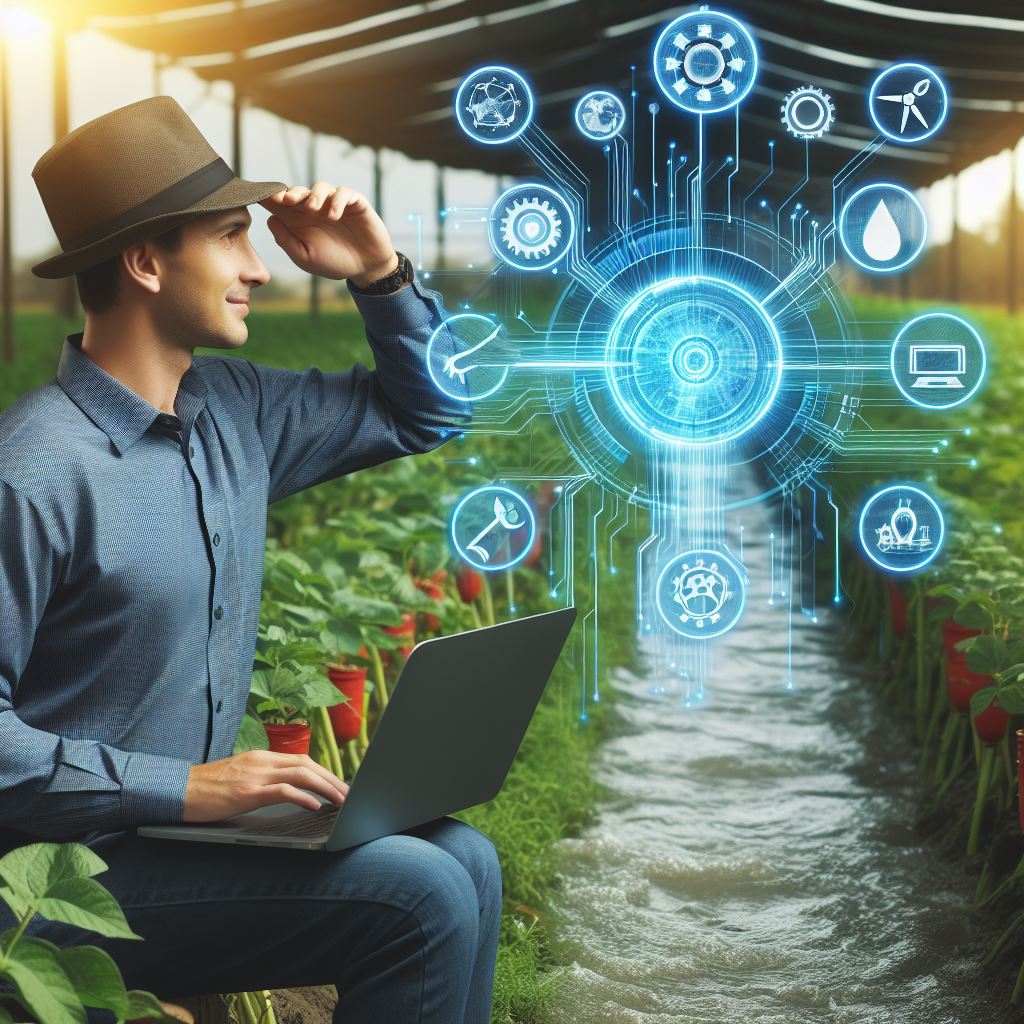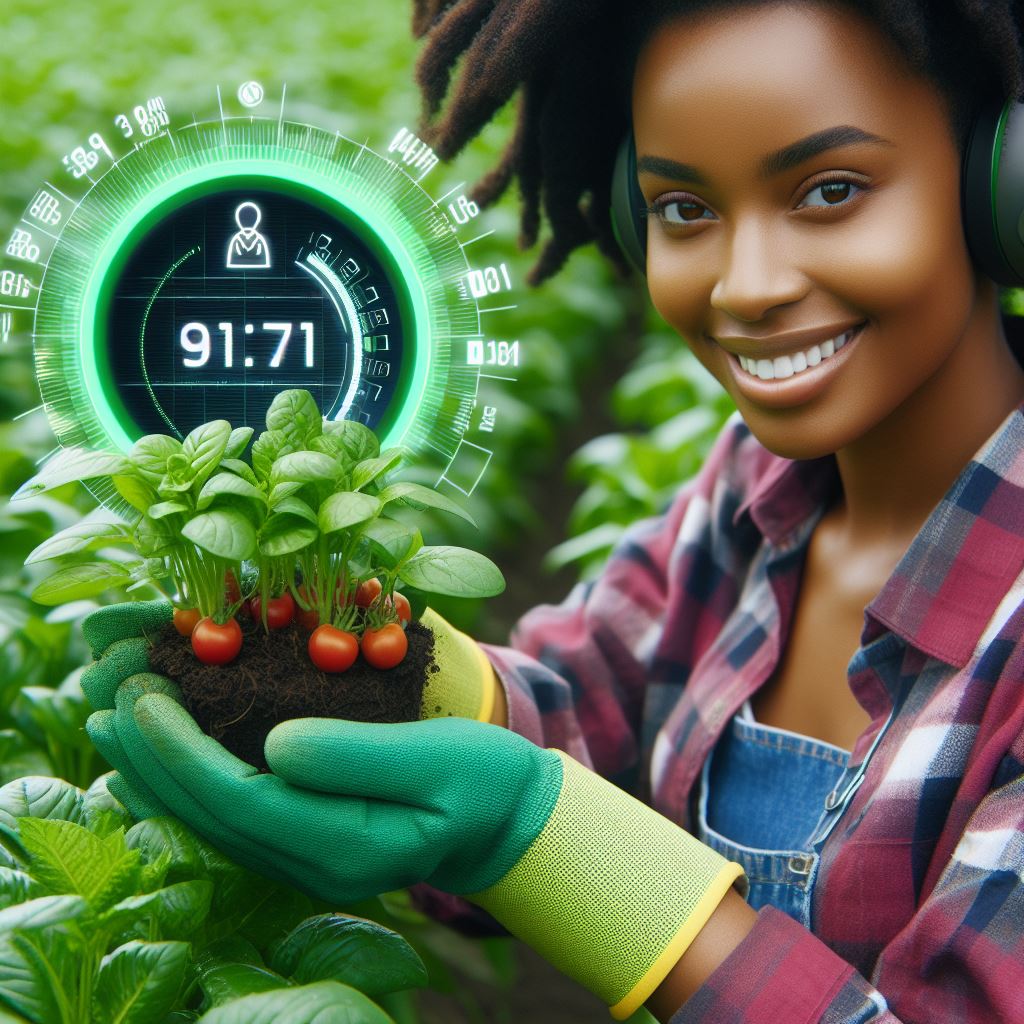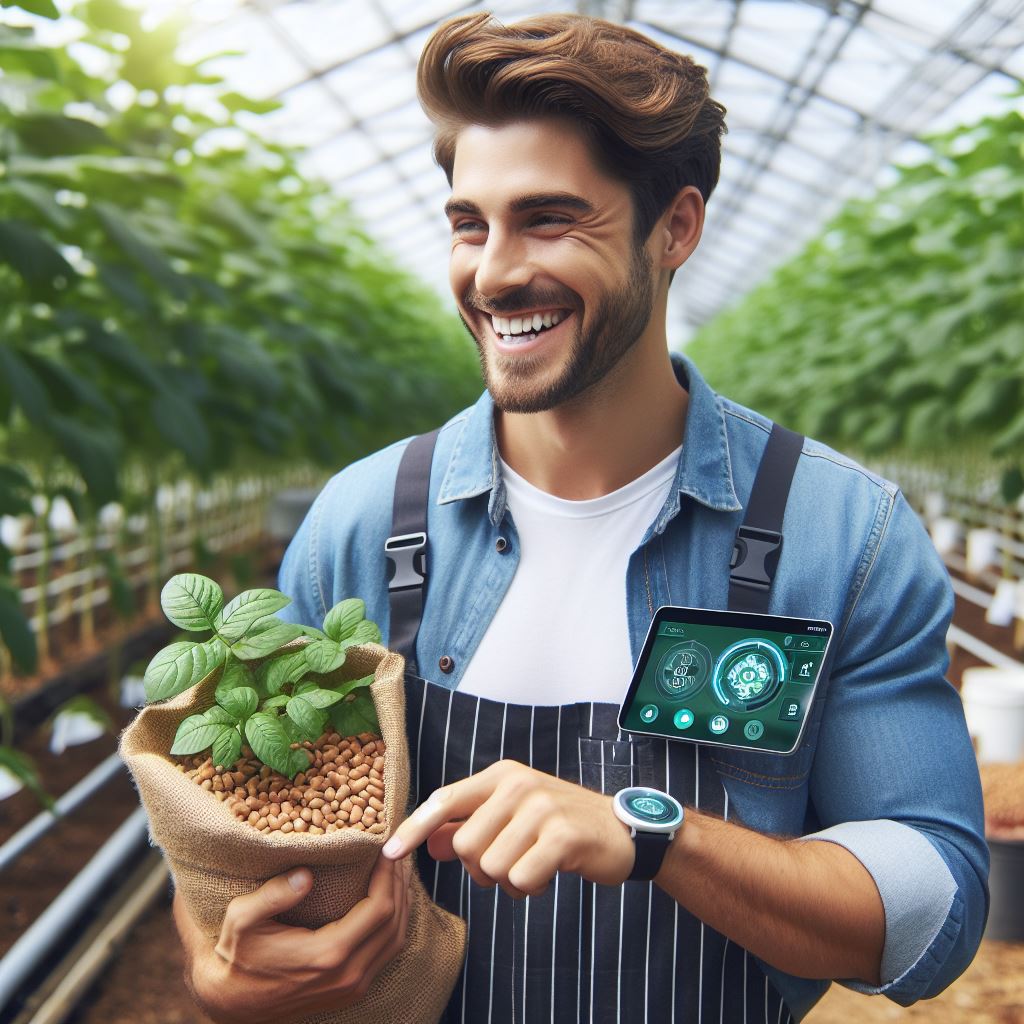Introduction
Smart Water Management Irrigation Tech plays a crucial role in agriculture, ensuring efficient water use for sustainable farming practices.
Advancements in irrigation technology have significantly improved water usage and conservation in recent years.
The purpose of this blog post is to provide an overview of the latest irrigation tech and highlight its importance inIntelligent water resource management.
Importance of Water Management in Agriculture
Water is a precious resource, and its proper management is vital for agricultural productivity and sustainability.
With increasing water scarcity and climate change, effective water management becomes even more critical.
Overview of Irrigation Technology Advancements
Advancements in irrigation technology have revolutionized the way farmers water their crops.
Smart irrigation systems now use sensors, weather data, and automation to optimize water usage.
Drip irrigation, for instance, delivers water directly to the plant roots, reducing wastage and ensuring efficient water distribution.
Similarly, precision sprinklers ensure that water is applied evenly, avoiding over or under-irrigation.
Purpose of the Blog Post
The purpose of this blog post is to educate readers on the latest developments in irrigation technology.
By understanding the benefits and applications of smart water management, farmers can make informed decisions to conserve water, enhance crop yield, and minimize environmental impact.
In general, effective water management is crucial for sustainable agriculture, and advancements in irrigation technology have made it easier to achieve.
By adopting smart water management practices, farmers can enhance productivity while conserving this precious resource.
Understanding Smart Water Management
Definition and key characteristics
Smart water management refers to the use of advanced technologies to efficiently manage water resources.
It involves collecting, analyzing, and applying data to make informed decisions about water usage.
Key characteristics of smart water management include real-time monitoring, data-driven decision making, automation, and optimization.
These technologies enable effective water resource management, leading to increased efficiency and sustainability.
Benefits of implementing smart water management systems
- Water conservation: Smart water management systems help to optimize water usage, reducing waste and conserving this precious resource. By tracking water consumption patterns, these systems can detect leaks or excessive usage, enabling prompt action.
- Cost savings: Implementing smart water management systems can result in significant cost savings. By reducing water loss and optimizing usage, businesses and households can lower their water bills and operate more efficiently.
- Environmental sustainability: By effectively managing water resources, smart water management systems contribute to environmental sustainability. These technologies promote responsible water usage and help to preserve natural ecosystems dependent on water.
- Improved infrastructure: Smart water management systems provide valuable insights into the condition of water infrastructure. By monitoring pipelines and equipment, maintenance can be scheduled proactively, preventing costly breakdowns and ensuring smooth operations.
Smart water management technologies
- Advanced metering infrastructure (AMI): AMI systems collect data on water consumption in real-time, allowing consumers to monitor and manage their usage more effectively. This technology enables water utilities to identify and address inefficiencies promptly.
- Leak detection systems: Smart water management technologies include leak detection systems that can pinpoint and alert users to leaks in water distribution systems. By detecting leaks early, prompt repairs can be made, reducing water loss and preventing damage to infrastructure.
- Irrigation automation: Smart irrigation systems use sensors and weather data to schedule irrigation based on actual plant needs and weather conditions. This technology helps optimize water usage, preventing overwatering and reducing water waste.
- Water quality monitoring: Smart water management systems include sensors that continuously monitor water quality. By detecting contaminants or changes in water composition, these technologies enable early detection of water pollution, ensuring the safety of water supplies.
In short, smart water management is a crucial aspect of sustainable water resource management.
By harnessing advanced technologies, such as AMI, leak detection systems, irrigation automation, and water quality monitoring, we can optimize water usage, conserve resources, and promote environmental sustainability.
The benefits of implementing smart water management systems extend to cost savings, improved infrastructure, and responsible water usage.
It is essential for governments, businesses, and individuals to recognize the importance of investing in these technologies to secure a sustainable future for our water resources.
Smart Irrigation Controllers
Definition and Functionality
- Smart irrigation controllers are advanced devices designed to automate and optimize watering systems.
- They use sensors and data analysis to adjust watering schedules based on weather conditions and soil moisture.
- These controllers allow precise control over irrigation, preventing water wastage and promoting healthier plant growth.
Features and Capabilities
- Smart irrigation controllers are equipped with Wi-Fi connectivity for remote access and control.
- They can sync with local weather stations to receive real-time data for accurate water management.
- These controllers have built-in moisture sensors to measure soil moisture levels and adjust irrigation accordingly.
- They can detect rainfall and automatically skip watering schedules if the soil is adequately watered.
Advantages of using smart irrigation controllers
- Water conservation: Smart controllers minimize water usage by watering only when necessary, based on actual plant needs.
- Cost savings: By preventing overwatering, these controllers lead to lower water bills and reduced maintenance costs.
- Efficiency: Smart controllers optimize irrigation schedules, saving time and effort for property owners.
- Healthy plants: Precise watering based on soil moisture and weather conditions promotes healthier plant growth.
- Environmental benefits: Smart controllers contribute to reducing water waste and conserving valuable resources.
- Convenience: Remote control and access allow users to manage irrigation systems from anywhere using mobile apps or web portals.
Smart irrigation controllers have revolutionized water management in agriculture, landscaping, and residential settings
Smart irrigation controllers use technology for efficient water usage, replacing outdated timers or manual adjustments.
They conserve water by adjusting schedules based on weather conditions and soil moisture, preventing overwatering.
Cost savings are substantial, significantly lowering water bills and preventing issues like root rot and fungal diseases.
Efficiency is a key feature, allowing users to effortlessly manage systems through mobile apps or web portals.
Smart controllers positively impact plant health, delivering the right amount of water at the right time, promoting stronger root systems.
Transform Your Agribusiness
Unlock your farm's potential with expert advice tailored to your needs. Get actionable steps that drive real results.
Get StartedEnvironmental concerns are addressed by conserving water, contributing to sustainable water management and preserving natural ecosystems.
Convenience is paramount, with Wi-Fi connectivity enabling users to monitor systems and adjust settings from anywhere.
In review, smart irrigation controllers offer benefits like water conservation, cost savings, and improved plant health for sustainable water management.
Read: Seasonal Soil Care for Maximum Yield
Soil Moisture Sensors
Soil moisture sensors have revolutionized the way farmers manage water resources.
By accurately measuring soil moisture levels, these devices empower farmers to make informed decisions regarding irrigation.
This section explores the definition, types, benefits, and successful implementation of soil moisture sensors.
Definition and Purpose
Soil moisture sensors are technological devices designed to measure the amount of moisture present in the soil.
The purpose of soil moisture sensors is to provide farmers with precise and up-to-date information on soil moisture levels, helping them optimize irrigation practices.
By avoiding under or over-irrigation, farmers can ensure better crop growth and maximize water efficiency.
Types of Soil Moisture Sensors
- Tensiometers: These sensors measure soil water tension, which indicates the pressure plants need to extract water from the soil. Tensiometers are known for their accuracy and reliability in assessing soil moisture levels.
- Time-domain reflectometry (TDR) sensors: These sensors operate by sending electromagnetic pulses into the soil and analyzing the reflected signals. Based on the time it takes for the signals to return, TDR sensors determine soil moisture content.
- Capacitance sensors: These sensors calculate soil moisture levels by analyzing the electrical capacitance between two electrodes. As soil moisture changes, the electrical properties also vary, allowing capacitance sensors to provide accurate moisture readings.
How Soil Moisture Sensors Improve Water Efficiency
- Precise irrigation scheduling: Soil moisture sensors offer real-time data on soil moisture, enabling farmers to schedule irrigation based on actual plant needs. This helps avoid unnecessary watering and minimizes water waste.
- Optimal water application: By continuously monitoring soil moisture levels, farmers can adjust the volume of water applied during irrigation. This ensures that plants receive the necessary moisture without excess runoff or wastage.
- Avoiding overwatering: Soil moisture sensors prevent over-irrigation, a common problem that can lead to soil leaching and nutrient loss. By providing accurate moisture readings, sensors help farmers avoid waterlogging and subsequent crop damage.
Examples of Successful Implementation
- California Almonds: Almond growers in California successfully implemented soil moisture sensors, resulting in a 20% reduction in irrigation water usage. This not only conserved water but also maintained crop quality and increased overall farm efficiency.
- Australian Vineyards: Vineyard owners in Australia embraced soil moisture sensors, leading to a 25% reduction in water consumption. This improved water management not only saved resources but also promoted healthier vine growth and higher grape yields.
- Israeli Agriculture: In arid regions, such as Israel, where water scarcity is a significant concern, soil moisture sensors revolutionized agriculture. These sensors played a vital role in transforming barren lands into highly productive farms by enabling efficient water usage.
Basically, soil moisture sensors are indispensable tools for smart water management in irrigation.
By accurately measuring soil moisture levels, these sensors help farmers make informed decisions, leading to optimal water usage, enhanced crop growth, and reduced water waste.
The successful implementation of soil moisture sensors in various regions has demonstrated their significant impact on improving water efficiency in agriculture.
Read: Eco-Friendly Pest Control in Farming
Weather-Based Systems
Definition and concept
Weather-based systems in irrigation technology refer to the use of weather data to control and optimize water management in agricultural practices.
These systems rely on real-time weather information and advanced algorithms to determine the specific water needs of crops.
Integration of weather data in irrigation management
The integration of weather data in irrigation management involves collecting and analyzing weather information such as temperature, humidity, wind speed, and rainfall.
This data is then used to calculate crop evapotranspiration rates, which determine the amount of water required for optimal plant growth.
Benefits of using weather-based systems
- Improved water efficiency: By utilizing weather data, farmers can accurately adjust irrigation schedules and durations, leading to more precise water application and reduced water waste.
- Enhanced crop yield and quality: Weather-based systems help ensure that crops receive the right amount of water at the right time, promoting healthy growth, higher yields, and improved quality of produce.
- Cost savings: With weather-based systems, farmers can optimize water usage, reducing the energy, labor, and maintenance costs associated with irrigation. This results in overall cost savings for agricultural operations.
- Environmental sustainability: By using weather-based systems, farmers can minimize water runoff and prevent over-irrigation, which can lead to soil erosion, water pollution, and depletion of water resources. These systems contribute to sustainable agricultural practices.
- Advanced planning and decision-making: Weather data integration allows farmers to anticipate weather patterns and adjust irrigation schedules accordingly. This helps in making informed decisions about planting, fertilization, and pest control.
Case studies demonstrating enhanced water management
- Case study 1: In a study conducted in California, a weather-based irrigation system was implemented in a vineyard. By using weather data for irrigation scheduling, the vineyard reduced water consumption by 20% without negatively affecting crop yield or quality.
- Case study 2: A vegetable farm in Australia implemented a weather-based irrigation system. By considering weather forecasts and real-time data, the farm optimized irrigation scheduling, resulting in a 30% reduction in water usage and increased crop yield.
- Case study 3: In India, a weather-based system was used in paddy fields. By integrating weather data, the farmers were able to reduce water usage by 25% while maintaining the desired paddy crop yield. This led to significant water savings in an area prone to water scarcity.
Overall, weather-based systems in irrigation technology offer numerous benefits, including improved water efficiency, enhanced crop yield and quality, cost savings, environmental sustainability, and advanced planning capabilities.
These systems have been proven effective in multiple case studies, demonstrating their potential for enhanced water management in agricultural practices.
Read: Understanding Soil Texture and Crops

Uncover the Details: Implementing IPM in Small Farms
Precision Sprinklers
Precision sprinkler technology revolutionizes water management in agriculture, horticulture, and landscapes.
With their advanced features and benefits, precision sprinklers are transforming the way water is used for irrigation.
These systems optimize water consumption, promote sustainable practices, and enhance crop productivity.
Introduction to Precision Sprinkler Technology
The introduction of precision sprinklers marks a significant advancement in irrigation technology.
Unlike traditional sprinkler systems, precision sprinklers utilize sensor-based technology and controlled irrigation to maximize water efficiency.
By targeting water application to specific areas, they minimize wastage and reduce the impact on natural resources.
Features and advantages of precision sprinklers
The features of precision sprinklers further contribute to their effectiveness.
These sprinklers allow farmers and landowners to adjust spray patterns according to specific watering requirements.
Adjusting the flow rate and direction of water ensures that each plant receives the desired amount of moisture.
This level of customization optimizes water usage and promotes healthy plant growth.
Another advantage of precision sprinklers is their ability to be programmed.
Users can set specific watering schedules, ensuring irrigation occurs at the most suitable times.
This feature prevents water loss due to evaporation, as watering can be scheduled during cooler periods or at night.
Additionally, precision sprinklers deliver water directly to the root zone, significantly reducing runoff and soil erosion.
Precision sprinklers play a vital role in water conservation.
By reducing water consumption by up to 50% compared to traditional irrigation methods, these systems alleviate pressure on dwindling water supplies.
They also contribute to sustainable water management practices by minimizing waste and maximizing efficiency.
This is particularly crucial in regions facing water scarcity and drought conditions.
Impact on water conservation and crop yield
The impact of precision sprinklers on crop yield is noteworthy.
By maintaining optimal soil moisture levels and minimizing stress on plants, precision sprinklers enhance productivity.
The controlled delivery of water ensures that crops receive adequate hydration without being overwatered.
This results in improved crop quality, increased yields, and ultimately, better economic returns for farmers.
Real-world examples of precision sprinkler usage
Real-world examples demonstrate the effectiveness of precision sprinklers in various settings.
Large-scale farms cultivating high-value crops benefit from the precision water application and reduced water consumption.
Vineyards, where precise irrigation is essential for grapevine health and quality, have seen significant improvements using precision sprinklers.
Additionally, precision sprinklers are extensively used in greenhouse farming, where specific watering needs of different plants can be catered to accurately.
Golf courses, often facing strict water regulations, utilize precision sprinklers to maintain their aesthetic appeal while conserving water resources.
Even in residential gardens, precision sprinklers provide efficient irrigation, allowing homeowners to enjoy lush and healthy landscapes.
Generally, precision sprinklers revolutionize irrigation practices with their advanced features and benefits.
These systems optimize water consumption, conserve water resources, and enhance crop yield.
From large-scale agriculture to residential gardens, precision sprinklers are an integral part of smart water management that promotes sustainability and efficiency in water usage.
Read: Optimizing Soil Fertility: Advanced Tips
Data Analytics and Automation
Water scarcity and the need to optimize resource usage have driven the adoption of innovative technologies such as data analytics and automation in irrigation.
These advancements aim to improve water management practices by providing valuable insights and efficient control mechanisms.
Utilizing data analytics for water management
Data analytics involves the collection, interpretation, and utilization of data to gain insights and make informed decisions.
When applied to water management, data analytics enables the analysis of various factors influencing water usage, such as weather conditions, soil moisture levels, and plant water needs.
By collecting and analyzing this data, farmers and water management authorities can identify patterns, trends, and potential areas for improvement.
For example, through data analytics, farmers can determine the optimal irrigation schedule and duration based on real-time weather data and crop-specific water requirements.
This avoids overwatering or under-watering, leading to efficient water usage and improved crop yields.
Data analytics also helps in identifying leakages or inefficient irrigation practices that may go unnoticed, enabling prompt action for mitigation.
Showcase Your Farming Business
Publish your professional farming services profile on our blog for a one-time fee of $200 and reach a dedicated audience of farmers and agribusiness owners.
Publish Your ProfileAutomation technologies for irrigation control
Automation technologies play a crucial role in optimizing water usage in irrigation systems.
These technologies involve the use of sensors, controllers, and timers to automate irrigation processes.
Soil moisture sensors measure the moisture levels in the soil, triggering irrigation only when necessary.
This prevents excessive watering and saves water.
Additionally, smart irrigation controllers can adjust irrigation schedules based on real-time weather data, ensuring that plants receive adequate water and minimizing water wastage.
These controllers can be programmed to consider factors such as temperature, humidity, and rainfall predictions.
Furthermore, automated valves and sprinklers enable precise control over the distribution of water, ensuring efficient coverage and avoiding overspray.
Significance of data-driven decision-making
Data-driven decision-making plays a vital role in effective water management.
By analyzing relevant data, stakeholders can gain valuable insights into water usage patterns, identify areas of improvement, and implement targeted strategies for conservation.
For example, analyzing data from different fields within a farming region can help identify areas with high water usage or inefficient irrigation practices.
This information can then be used to provide guidance and support to farmers in implementing more efficient irrigation techniques, reducing water consumption, and minimizing the environmental impact.
Data-driven decision-making also enables the prediction of water demands and helps in planning and allocation of water resources accordingly.
By considering factors such as crop water requirements, soil conditions, and expected weather patterns, authorities can make informed decisions to ensure water availability for agriculture, industry, and households.
In fact, data analytics and automation technologies offer significant benefits in water management.
By utilizing data analytics, stakeholders can gain insights into water usage patterns and identify areas for improvement.
Automation technologies enable precise control over irrigation systems, optimizing water usage.
Data-driven decision-making ensures effective water management, resulting in conservation efforts and cost reduction.
Embracing these technologies is crucial for sustainable water management in the face of increasing water scarcity.
Gain More Insights: IPM: Maximizing Crop Production
Conclusion
Smart water management technologies have been discussed, including drip irrigation and soil moisture sensors.
It is crucial for farmers and irrigation professionals to adopt these smart irrigation practices for efficient water usage.
The future holds promising possibilities for advancements in irrigation technology, such as Artificial Intelligence and remote sensing systems.
In summary, smart water management is essential for sustainable agriculture and conserving our precious water resources.
By implementing smart irrigation technologies, we can optimize water usage, reduce costs, and improve crop yield.
It is crucial for individuals and the industry to embrace these practices and stay updated with the latest advancements in irrigation technology.
The use of intelligent systems and data-driven decision-making will revolutionize irrigation practices, leading to enhanced productivity and environmental sustainability.
As we continue to address the challenges of water scarcity and increasing global food demand, the adoption of smart water management practices will play a vital role in ensuring a secure and prosperous future for agriculture.




